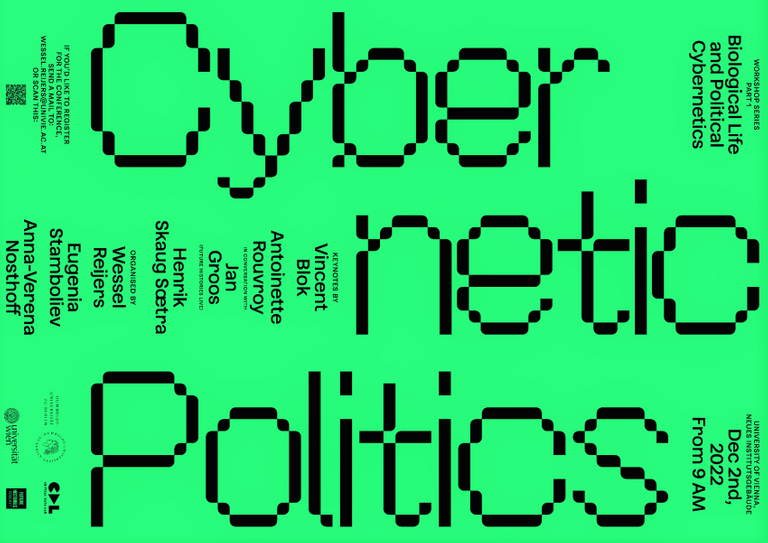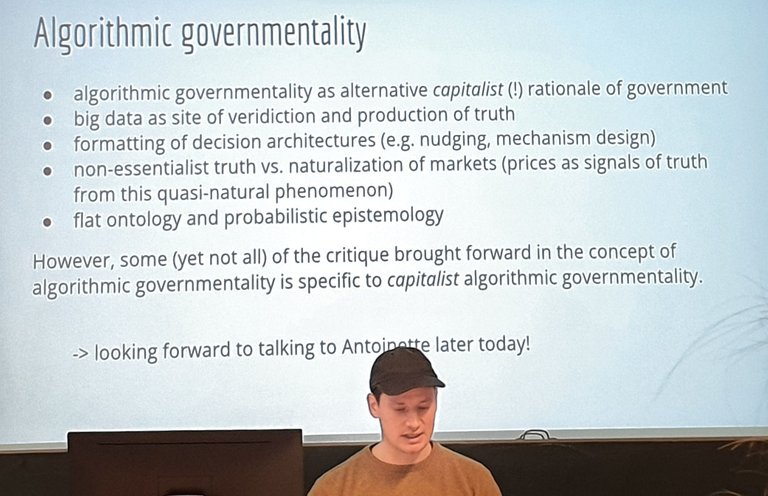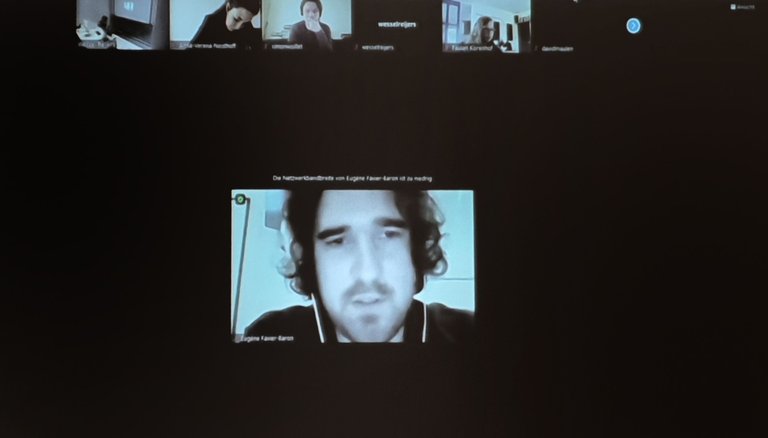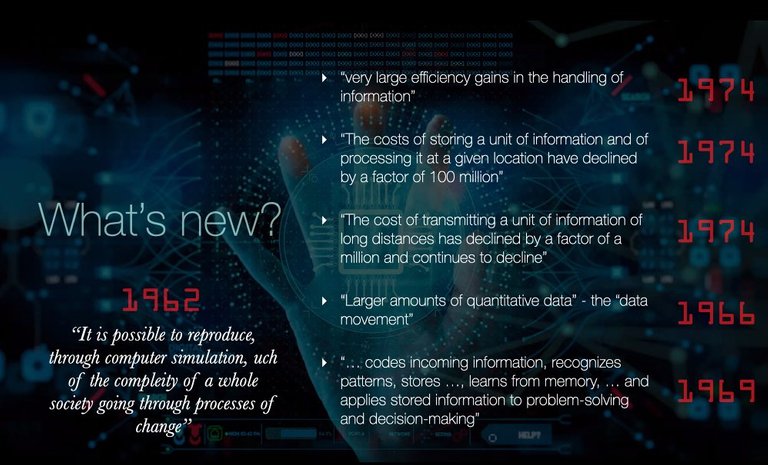Abstract
A workshop series ‘Biological Life and Political Cybernetics’ review of the first part, held at the University of Vienna, Department of Philosophy and organized by Anna-Verena Nosthoff, Eugenia Stamboliev and Wessel Reijers on December 2, 2022. The workshop and hybrid online conference sought to explore the interface of biological concepts like homeostasis, ingestion, animal and human behavior in entanglement with the political realm. The appliance of historical and philosophical methods to cybernetics and its current positions in academia, economy and society complemented the overall view.

The one-day workshop brought together about 20 scholars from the Netherlands, Germany, France, Norway and Belgium to discuss certain facets of the cybernetic field of study in extension to further parts of which the second part will be about Cybernetics and Capitalism and the third part about Emancipatory Cybernetics. It remains to be seen whether there will be a publication of the 3-parts workshop series conducted by the organizers. The advantage of this blogpost lies in its openness not being restricted by certain formatting schemes and not having any constrains by publishing houses allowing it to replay, express and report on the unspoken that happens in-between lines. Since cybernetics is a cross-sectional field combining many disciplines as well as systems theory, the workshop has been a first effort to examine the status quo at certain theoretical disciplines as well as in current (political) practice.
Jan Groos’ first presentation Planning as an Art of Government promised to provide alternatives to neoliberal modes of governmentality but actually sought to construct on the note and attempts of a socialist algorithmic governmentality. Even if it can be questioned whether socialism really has to be seen as the diametrical opposite of capitalism, his elaborations of markets as sites of veridiction (see Liz Truss), big data and algorithmic governmentality have been very instructive. His efforts to build a philosophical career on podcasting are in any case to be observed with great interest.


Not everybody is able to understand French, so it is all the more important that Eugène Favier-Baron has summarized the work The problem of regulations in the organism and in society by Georges Canguilhem in his overview presentation to go into more detail about the concept of homeostasis and its usefulness for cybernetics. He rightfully pointed out the limits of the metaphor in a mustering of Walter Cannon’s work on political systems. For additional reading Murphy’s paper Not so new materialism: Homeostasis Revisited has to be mentioned which picks up the metaphor in a more positive light and maps out why there’s still value for environmental humanities and contemporary eco-discourses to the extent of the body physiologic-body politic dichotomy. Eugène’s co-presenter Simon Woillet subsequently touched upon the post-political side of homeostasis rounding it up in a Q&A about the uberization of the state, state reforms in the EU, government as a platform and Macronian politics.
The capability of the next presenter Henrik Skaug Sætra to make his keynote as vivid as possible, at times even making use of filmosophy, has made the topic both educational and entertaining. Any layperson not familiar with the subject would have had a great pleasure to experience his elaborate presentation Political cybernetics and the enduring value of human chaos. Holism or Individualism? How do we deal with dichotomies in political cybernetics? Do feedback-loops bring about positive or negative amplifications? Were just three of many questions he started to unfold. The core of his presentation was clearly his historical reappraisals and comparison of several decades old theoretical ideas that are strongly dominating today's practice or are even sold by companies as novelties. With this he indirectly strengthened the relevance of historical and philosophical research and the awareness of not being misled by supposedly old marketing narratives.

Paulan Korenhof opened up with her dissertation research on digital twins and also how power relations that are indirectly inherent in the use of certain apps influence our daily lives. She gave examples such as BMI as personalized digital twin, which affects in a continuous loop what we should or should not eat. The presentation of DestinE, a digital twin developed by the European Union to more aptly analyze the Earth’s environment provided guidance on how modeling and simulation can take place on a global scale:
“Destination Earth (DestinE) aims to develop – on a global scale - a highly accurate digital model of the Earth to monitor and predict the interaction between natural phenomena and human activities. As part of the European Commission’s Green Deal and Digital Strategy, DestinE will contribute to achieving the objectives of the twin transition, green and digital.” (European Commission, 2022)
In general, the issue of whether digital twins should be built on big data or small data was a crucial one, especially since the normative perspective of both approaches is very often disregarded. My question at the end of her talk that in crypto we also refer to digital twins when asset classes like real estate are mirrored in the digital world or metaverse, was complementing Korenhof's presentation and broad approach with another practical example out of the financial perspective. Anyone who assumes that all assets will be tokenized is certainly close to the movement of the blockchain singularity:
“Blockchain singularity is a term used to describe the point at which the blockchain technology becomes so widely adopted that it becomes a ubiquitous part of the global economy. The term is derived from the idea of technological singularity, which is the point at which artificial intelligence surpasses human intelligence. Blockchain singularity is often seen as the point at which the blockchain technology achieves mainstream adoption and will eventually lead to a state where there is one global blockchain that everyone uses. This would be a major shift from the current situation, where there are many different blockchains with different features and purposes.” (Jung, 2022)
In the second keynote, which happened as a Live podcast session carried out by Jan Groos, Antoinette Rouvroy has proven herself as the expert for algorithmic governmentality. With her profound and broad expertise covering the legal as well as the STS perspective, she delivered many practical examples, from the big data kraken Facebook to highly and not always easy to uncover engineered governance structures at Amazon. She presented her cybernetics hypotheses based on data proliferating from our behavior with our environment. Her approach that political norms could be modeled via quantifiable signals is particularly noteworthy, as is the construction of informed regulation via anticipatory configurators of possibilities. Her concept, which is agile enough in itself to represent dynamic processes, gives the possibility to make obscured governance structures more obvious, she herself said that one wouldn't even speak of “govern but render power”. To model and anticipate possible behavior on the base of data has again underlined why corporations call data the gold of their time.
Vincent Blok gave the third keynote of the day with the main area of Technology, Mimesis and the Human Condition in the Anthropocene.
”As long as you try to mimic a bird you will never fly” (Blok)
With this quote, boundaries of homo mimeticus were assessed. All technology is mimetic. Mimesis distinguishes humans from other animals. Technologies like the ax are associated with humans’ deviation from the natural state. How do different forms of mimesis help with the sustainability aspect, Mark Coeckelbergh asked in extension of Blok’s presentation leading to a deeper probing of the principles in nature: Who is going to recycle the cycles? Eugenia Stamboliev’s question whether AI is a form of mimesis of the human brain closed the discussions and circle back to the bird metaphor. To Blok's credit, although his keynote was actually delivered in the form of a talk, he managed to open it up in a way that allowed for a high level of interactivity among participants, he enforced and kept the workshop character alive: A well-rounded and enjoyable event. In the evening conversations continued in the cozy restaurant Das Käuzchen



To cite this blogpost:
Stachniewicz, Alexander M. (2022): Biological Life and Political Cybernetics Workshop Review. Retrieved from: https://hive.blog/hive-196387/@sciencevienna/biological-life-and-political-cybernetics-workshop-review

Thanks for your contribution to the STEMsocial community. Feel free to join us on discord to get to know the rest of us!
Please consider delegating to the @stemsocial account (85% of the curation rewards are returned).
You may also include @stemsocial as a beneficiary of the rewards of this post to get a stronger support.
Congratulations @sciencevienna! You have completed the following achievement on the Hive blockchain And have been rewarded with New badge(s)
Your next target is to reach 10000 upvotes.
You can view your badges on your board and compare yourself to others in the Ranking
If you no longer want to receive notifications, reply to this comment with the word
STOPCheck out the last post from @hivebuzz:
Support the HiveBuzz project. Vote for our proposal!
Your support for the current HiveBuzz proposal (#199) is much appreciated but the proposal will expire soon!
May we ask you to review and support the new proposal so our team can continue its work?
You can support the new proposal (#248) on Peakd, Ecency, or using HiveSigner.
Thank you!Dear @sciencevienna,
done
Your support for the current HiveSQL proposal (#138) is much appreciated but the proposal will expire end of December!
May I ask you to review and support the new proposal (#247) so HiveSQL can stay free to use for the community?
You can support it on Peakd, Ecency, or using HiveSigner.
Merry Christmas to you and your family ??Dear @sciencevienna,
done!
Ho Ho Ho! @sciencevienna, one of your Hive friends wishes you a Merry Christmas and asked us to give you a new badge!
The HiveBuzz team wish you a Merry Christmas!
May you have good health, abundance and everlasting joy in your life.
To find out who wanted you to receive this special gift, click here!
You can view your badges on your board and compare yourself to others in the Ranking
Check out our last posts:
!PIZZA
 For you @sciencevienna , thank you for your support. !BEER
For you @sciencevienna , thank you for your support. !BEER
$PIZZA slices delivered:
(2/10) @darkflame tipped @sciencevienna